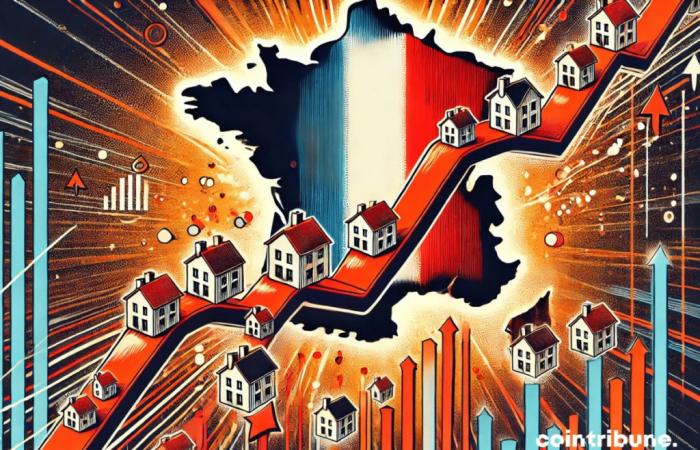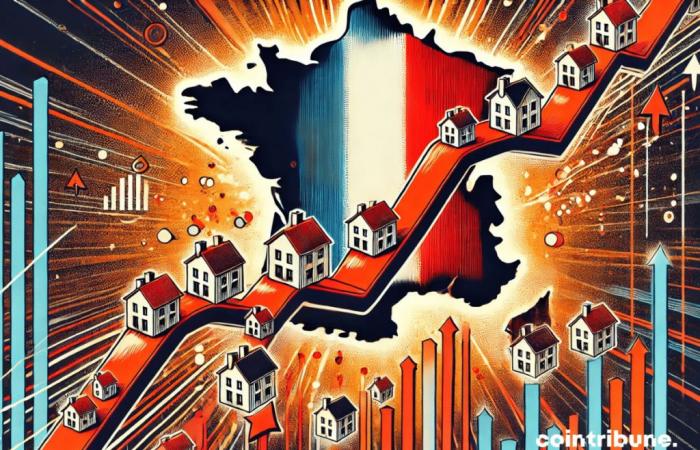18:00 ▪
5
min reading ▪ by
Luc Jose A.
The French real estate market is going through a period of turbulence, despite signs of calm after two years of marked depression. Indeed, the figures recently published by the Notaries of France reveal a double observation: real estate prices have fallen, but this reduction has not been enough to revive sales. Thus, in 2024, the number of transactions saw a spectacular drop, which illustrates a deep blockage in the sector. This situation, both paradoxical and alarmist, calls into question the factors which are slowing down the recovery of the market and the economic and political dynamics which amplify its complexity.
Real estate sales in free fall: a deep crisis
In 2024, the French real estate market recorded a brutal drop in transactions, with only 750,000 sales, compared to 1.2 million in 2021. This drop of 17% compared to the previous year takes place in a context marked by a series of unfavorable factors. Among them, the political instability that followed the parliamentary dissolution of June 2024 played a central role. Maître Priscille Caignault, notary and member of the Office of the Superior Council of Notaries, declares that “this instability has pushed market players to adopt a defensive posture”. This decline affects all market segments, whether old housing, new construction or even building land.
At the same time, economic conditions did not allow the situation to be rectified. Although real estate prices fell by an average of 3.9%, and interest rates for a 20-year loan reached a relatively low level of 3.15%, these favorable factors did not enough to revive demand. Households continue to express great caution in the face of the prevailing uncertainty. A joint study by INSEE and the Banque de France also highlights a continued decrease in household real estate assets, which now stands at 14,567 billion euros, a contraction of 0.9% compared to 2023. This erosion of assets reflects not only a loss of value of real estate, but also an economic fragility which slows down the recovery of the market.
Growing purchasing power, but for whom?
The fall in property prices in 2024 brought a measured improvement in purchasing power, estimated at +4% over one year. However, this progress remains uneven. Households with the highest incomes are the first beneficiaries of this trend, in particular thanks to advantageous credit rates which are around 3%, accessible only to the best financial profiles. On the other hand, for middle-class households, access to credit remains complex. These households must face more restrictive conditions which hamper their purchasing capacity and thus limit their participation in an already difficult market.
Such disparities reveal marked geographic divides. For example, a monthly payment of €800 would allow a buyer to acquire 111 m² in Saint-Étienne, but only 41 m² in Marseille, and barely 12 m² in Paris. These gaps reflect economic differences, but also disparities in terms of attractiveness and regional dynamism. The real estate market thus reflects a growing divide between large metropolises, where prices remain prohibitive, and medium-sized towns, which are often more accessible. This situation exacerbates social inequalities, which creates a divide which further hampers the balance and cohesion of the national market.
The French real estate market ends 2024 in an uncertain situation. Despite falling credit rates and a slight improvement in purchasing power, these measures remain insufficient to stem the decline in transactions. To restore confidence, professionals are calling for structural reforms capable of offering lasting solutions, in particular by facilitating access to property for low-income households. In the absence of such adjustments, disparities between regions and social categories risk becoming further accentuated. In this context of political tensions and marked inequalities, the future of the sector will depend on the capacity of decision-makers to respond to the systemic challenges that are holding back a balanced recovery.
Maximize your Cointribune experience with our ‘Read to Earn’ program! For every article you read, earn points and access exclusive rewards. Sign up now and start earning benefits.
Luc Jose A.
A graduate of Sciences Po Toulouse and holder of a blockchain consultant certification issued by Alyra, I joined the Cointribune adventure in 2019. Convinced of the potential of blockchain to transform many sectors of the economy, I took the commitment to raise awareness and inform the general public about this constantly evolving ecosystem. My goal is to enable everyone to better understand blockchain and seize the opportunities it offers. I strive every day to provide an objective analysis of current events, to decipher market trends, to relay the latest technological innovations and to put into perspective the economic and societal issues of this ongoing revolution.







